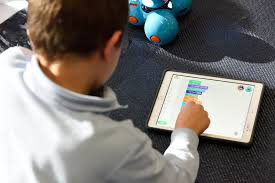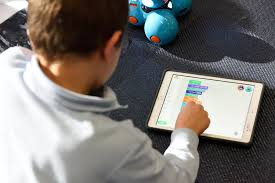How do kids learn Spanish games?
Here you can find an overview of the 7 best free Spanish learning games:
- Rockalingua. Level: Children and Beginners.
- Word Toss. Level: Beginners.
- Spanish in Flow. Level: Beginners and Intermediate.
- Spanish-Games.net. Level: Beginners.
- The Dialogue Game. Level: Intermediate to Advanced.
- Digital Dialects.
- PollyLingual.
What is the best way to teach Spanish for kids?
Teach Spanish: Strategies for Success
- Learn along with your child.
- Set up a daily schedule for language learning.
- Choose your themes when you teach Spanish.
- Use props and TPR.
- Combine learning and play.
- Add Spanish to established routines.
- Try family ‘Spanish time’ once a week.
How can kids learn Spanish for free?
What is the Best Spanish Website? 5 Fantastic and Free Spanish Websites for Kids
- OnlineFreeSpanish. OnlineFreeSpanish is one of our personal favorites for learning Spanish for kids.
- ABCYA. ABCYA teaches elementary school students a multitude of subjects.
- Digital Dialects.
- PBS.
Does playing games in Spanish help you learn? Yes, Spanish learning games and even video games can help you learn and master Spanish faster and improve overall comprehension. Research studies have concluded that video games enhance traditional learning methods and make mastering a new language like Spanish fun and exciting.
How do kids learn Spanish games? – Additional Questions
Can you learn a language by playing games in that language?
The research shows that video games, too, can be effective language learning tools. They offer a variety of benefits all at once: engaging dialogue, a variety of grammar structures, new vocabulary, stress relief, and also the possibility of making new friends.
How games are helpful for learning language?
Games help students to make and sustain the effort of learning. Games provide language practice in the various skills – speaking, writing, listening and reading. They encourage students to interact and communicate. They create a meaningful context for language use.
What are the 4 language games?
Language Learning games for the classroom are one of the best ways to promote language learning.
- Twenty Questions. Why Play This Game?
- Pictionary. Why Play This Game?
- Taboo. Why Play This Game?
- Stop! Why Play This Game?
- Hangman. Why Play This Game?
- Spiderweb. Why Play This Game?
- Word Jumble. Why Play This Game?
- Charades.
What are types of language games?
List of common language games
| Host Language |
Name |
| English |
Polysyllabic ollysllabic |
| English |
Cockney rhyming slang |
| English |
Gibberish |
| English |
Inflationary English |
What are some examples of language activities?
Fun activities that help develop language learning in children
- Word games. Expand your children’s vocabulary with word games.
- Jokes. Telling age-appropriate puns will also help foster good humour and creativity in children.
- Riddles.
- Rhymes.
- Homonyms.
- Storytelling.
- Songs.
- Tongue twisters.
How do board games help language development?
There are many board games that are used in speech therapy to encourage the development of speech, language, and social skills. You can work on everything from learning how to take turns, to categorizing, making inferences, social skills, and oral narratives (i.e. story telling).
Why songs and games are important in teaching children language skills?
They are valuable resources to expand students’ abilities in listening, speaking, reading, and writing. They can also be exercises to teach a variety of language matters such as sentence patterns, vocabulary, pronunciation, rhythm, adjectives, and adverbs.
What are the benefits of educational games?
10 Benefits to Playing Games in the Classroom
- More Motivation. Playing games in the classroom increases overall motivation.
- Controlled Competitiveness. Students can become very competitive in the classroom, especially boys.
- Strategy Simulator.
- Peer Positivity.
- Smaller Stress.
- Mighty Memory.
- Class Cooperation.
- Alert Attention.
Can playing serious games help students learn a new language in English speaking?
Learning games also called serious games, provide the teachers with the facility of repeating and recalling the concepts where memorization is the requirement for language learning and improves their learning skills (Müller et al., 2018).
Are educational language games effective in the classroom?
According to Richard-Amato (1996), even though games are often associated with fun, we should not lose sight of their pedagogical values, particularly in second language teaching. Games are effective because they provide motivation, lower students’ stress, and give them the opportunity for real communication.
How effective are ESL games?
The data collected after analysis revealed that games could indeed accustom learners with new words and phrases and aid in deep-seated retention of vocabulary in a better, faster and more engaging way in comparison to memorization or textbook study. Games also help develop learners’ communicative abilities.
How effective are ESL games vs traditional learning?
Use of games is a good classroom strategy to aid learners in their retention of vocabulary and getting accustomed with natural English phrases. Only 60% of the respondents strongly agreed that games helped learners increase their vocabulary and natural English phrases whereas the rest of 40% agreed to it.
Do educational games promote better learning?
According to research, using games in teaching can help increase student participation, foster social and emotional learning, and motivate students to take risks. One study of the popular multiple-choice quiz game Kahoot found that it improved students’ attitudes toward learning and boosted their academic scores.
Why are games important in ESL classroom?
Playing games in the classroom increase overall motivation. By playing games, students become more motivated to learn, pay attention and participate in set tasks. Games help students to become a part of a team as well as take responsibility for their learning. playing games creates a positive attitude toward learning.
What is game-based learning approach?
Game-based learning refers to the borrowing of certain gaming principles and applying them to real-life settings to engage users (Trybus 2015). The motivational psychology involved in game- based learning allows students to engage with educational materials in a playful and dynamic way.
What are some examples of game-based learning?
Example Of Game-Based Learning #3: Assessing With Kahoot
He used the popular tool Kahoot to create formative assessments or review games. Kahoot is a quiz game where teachers can write multiple choice questions and Kahoot will track the points of everyone in the class and export the data to a spreadsheet for analysis.
What is a kahoot game?
Kahoot is an online game based learning platform. It allows teachers, organizations and parents to set up fun web based learning for others. This could include your coaches, athletes or parents.




